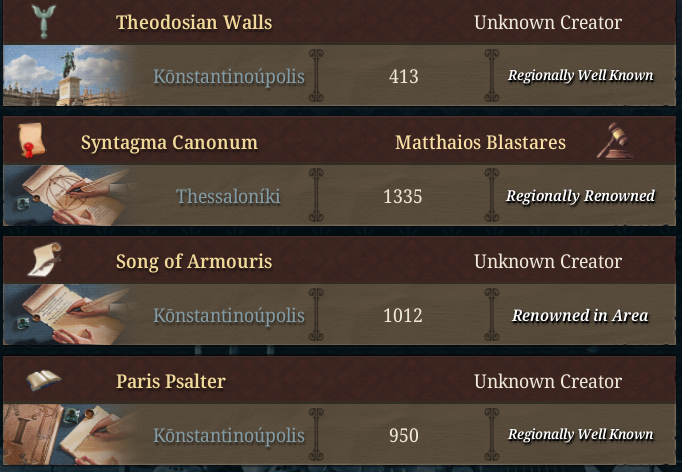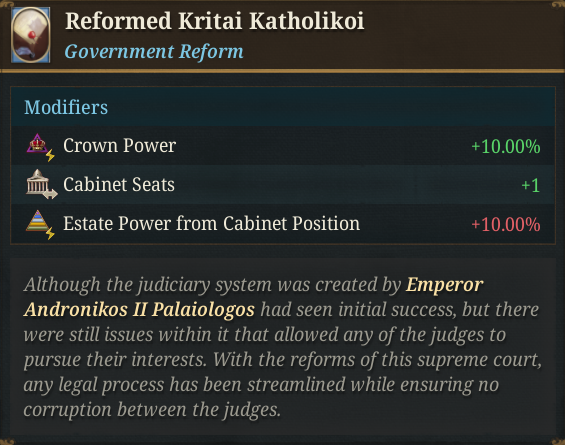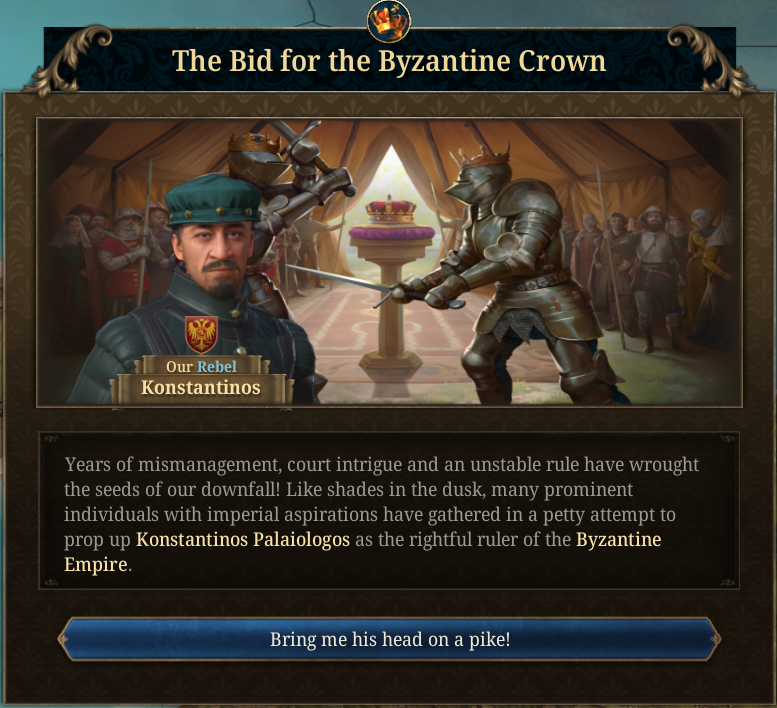Hello, and welcome one more Friday to Tinto Flavour, the happy days in which we take a look at the flavour content of Europa Universalis V!
Today, a day after an infamous anniversary, we will be taking a look at the Byzantine Empire - or Eastern Roman Empire, as you’re free to pick the custom name you prefer for it, as it’s a game rule that you can set before starting the game:


Let’s now start with the content itself:


As usual, please consider all UI, 2D and 3D art WIP.


As I don’t want to spark yet another Byzantine discussion, and its subsequent civil war, here you have a couple of map screenshots, with a different country name option each!
Byzantium (which is the name that I will use from now on, as being the most commonly used by the community) starts with a bunch of reforms and privileges:

Most of the Estate Privileges are generic ones, but there’s a unique one for each estate. We will show them in a later section of the TF, as they’re related to the Byzantine Succession Crisis, a disaster that may happen to Byzantium early on.
Regarding the starting reforms, the first is a generic one, while the other two are unique ones:




Byzantium starts with a ‘State Patriarchy’ policy, as shown last Wednesday:

And some other unique policies:


It also has quite a bunch of starting works of art:


The Theodosian Walls are also represented through a unique building:

Byzantium also has a bunch of advances; we are going to focus on the early-game, historical ones, as they also unlock some Byzantine unique units:












Let’s now move on to the narrative content for Byzantium. As I mentioned previously, a Succession Crisis is latent in the country, and that would historically lead to the Byzantine Civil War of 1341-1347, which allowed King Stefan Dusan of Serbia to occupy Macedonia and proclaim himself emperor, the Bulgarians to recover some borderlands, and seriously debilitated the country, making it easier for the Ottomans to gain a foothold across the Sea of Marmara, from Gallipoli.
We’re portraying this latent crisis and the general state of decay of the country by some starting privileges, plus some starting inflation, low funds and stability, etc.:




This situation will also spawn in your neighborhood a couple of months after the game starts, although we will talk more in detail about it next Friday:

And it’s very likely that this disaster may end up triggering early after the start of the game, if you are not careful enough:



It is something we internally call Semi-Generic Disaster. This means that while it uses the texts, panel, etc. of the generic ‘Succession Crisis’ disaster, some countries have unique triggers, events, and content attached to it, so the player can experience similar, but different crisis. The Byzantine Succession Crisis is one of those, therefore.
Independent of whether the player succeeds or not in defeating the Succession Crisis, and not weakening much in the process, Byzantium has a bunch of Dynamic Historical Events:










Byzantium also has some alt-historical events, one of the few exceptions we make in the game, to include some plausible content in case that Byzantium avoid its decadence…
… However you will have to find it by playing the game when we release it, as that’s all for today! As today is Friday, this will be the schedule for next week:
Today, a day after an infamous anniversary, we will be taking a look at the Byzantine Empire - or Eastern Roman Empire, as you’re free to pick the custom name you prefer for it, as it’s a game rule that you can set before starting the game:


Let’s now start with the content itself:


As usual, please consider all UI, 2D and 3D art WIP.


As I don’t want to spark yet another Byzantine discussion, and its subsequent civil war, here you have a couple of map screenshots, with a different country name option each!
Byzantium (which is the name that I will use from now on, as being the most commonly used by the community) starts with a bunch of reforms and privileges:

Most of the Estate Privileges are generic ones, but there’s a unique one for each estate. We will show them in a later section of the TF, as they’re related to the Byzantine Succession Crisis, a disaster that may happen to Byzantium early on.
Regarding the starting reforms, the first is a generic one, while the other two are unique ones:




Byzantium starts with a ‘State Patriarchy’ policy, as shown last Wednesday:

And some other unique policies:


It also has quite a bunch of starting works of art:


The Theodosian Walls are also represented through a unique building:

Byzantium also has a bunch of advances; we are going to focus on the early-game, historical ones, as they also unlock some Byzantine unique units:












Let’s now move on to the narrative content for Byzantium. As I mentioned previously, a Succession Crisis is latent in the country, and that would historically lead to the Byzantine Civil War of 1341-1347, which allowed King Stefan Dusan of Serbia to occupy Macedonia and proclaim himself emperor, the Bulgarians to recover some borderlands, and seriously debilitated the country, making it easier for the Ottomans to gain a foothold across the Sea of Marmara, from Gallipoli.
We’re portraying this latent crisis and the general state of decay of the country by some starting privileges, plus some starting inflation, low funds and stability, etc.:




This situation will also spawn in your neighborhood a couple of months after the game starts, although we will talk more in detail about it next Friday:

And it’s very likely that this disaster may end up triggering early after the start of the game, if you are not careful enough:



It is something we internally call Semi-Generic Disaster. This means that while it uses the texts, panel, etc. of the generic ‘Succession Crisis’ disaster, some countries have unique triggers, events, and content attached to it, so the player can experience similar, but different crisis. The Byzantine Succession Crisis is one of those, therefore.
Independent of whether the player succeeds or not in defeating the Succession Crisis, and not weakening much in the process, Byzantium has a bunch of Dynamic Historical Events:










Byzantium also has some alt-historical events, one of the few exceptions we make in the game, to include some plausible content in case that Byzantium avoid its decadence…
… However you will have to find it by playing the game when we release it, as that’s all for today! As today is Friday, this will be the schedule for next week:
- Monday -> Tinto Maps Feedback about the Steppes
- Tuesday -> Tinto Flavour about the Golden Horde
- Wednesday -> Tinto Talks about Islam
- Thursday -> Fourth ‘Behind the Scenes’ video!
- Friday -> Tinto Flavour about the Ottomans and the Rise of the Turks situation!








